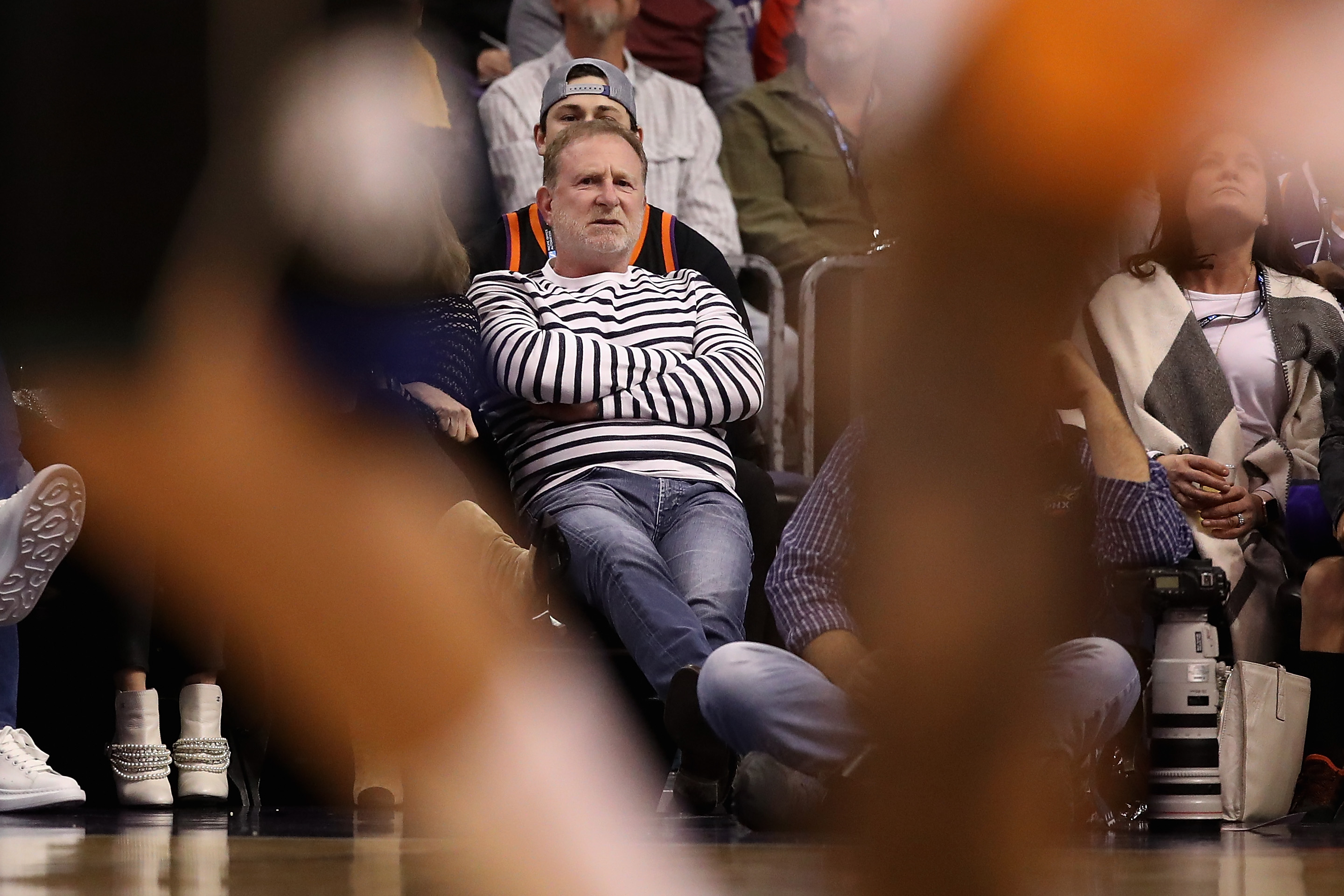Somewhat vague rumors back in October of an upcoming reported story "accusing Suns owner Robert Sarver of racism, sexism and sexual harassment" were treated as serious enough by the Suns organization that it took the unusual step, on October 22, of issuing not one but two official statements refuting the report's details, none of which at the time had been made public. This double-barreled preemptive strike was a pretty good indicator that the eventual report, wherever and whenever it eventually became public, would have the goods. My friends, the report, which ESPN finally dropped Thursday, does indeed have the goods. Sarver, according to a really striking number of people who've worked for him, appears to be both a horrible boss and a nightmare person.
The allegations run the gamut: Sarver using the n-word, and making other deeply inappropriate comments with offensive racial overtones; Sarver making creepy, sexualized comments and jokes to and around female employees; Sarver explicitly treating his employees as personal property; Sarver making insane, humiliating demands of his coaches and basketball personnel; Sarver fostering such a hostile work environment that his own HR personnel felt compelled to advise employees to sue the organization; Sarver, uhh, distributing photos of his wife in a Suns bikini:
Early in his tenure as owner, Sarver once tried to impress upon employees how big of a Suns fan he was and how excited he was to lead the organization. After all, he had been attending games since he was 8 years old.
In one meeting, to drive home his point, Sarver passed around a picture of his wife in a Suns bikini, multiple former longtime employees told ESPN.
One former executive who was in the meeting said, "We're passing it around like a hot potato. Like, what in the hell are we supposed to do with this? That was just, you know, one early glimpse at the man."
Baxter Holmes, ESPN
It somehow gets more absurd from there: Sarver pantsing an employee in front of several dozen coworkers during a charity stunt; Sarver prohibiting the holding of pens and clipboards on the sideline among his then-coaching staff; Sarver asking Blake Griffin's brother whether he shaves his balls:
During the 2009–10 season, Sarver entered the Suns' training room and saw reserve forward Taylor Griffin, older brother of NBA forward Blake Griffin, lifting weights. He noticed that the 6-foot-7, nearly 240-pound Griffin, who had been a serious weightlifter dating back to high school, didn't have hair on his legs.
Sarver, according to two people who witnessed the interaction, asked Griffin whether he shaved his legs. Griffin said he did. Sarver then asked, "Do you shave your balls, too?" One basketball operations staffer said Sarver separately asked the question of others in the organization several years later.
Baxter Holmes, ESPN
This is now a problem for the NBA to solve, even if it feels slightly funny to describe it that way. Holmes has given us a portrait of an uberwealthy businessperson who bought their way to the top of a hierarchical organization and brought along with them the same psychotic notion of the entitlements of wealth and ownership that is by definition common to quite literally every single member of that economic tier. The blundering barefacedness of it is only superficially distinct from the midtown restauranteur who spends four nights a week singing amateur jazz standards from atop the literal tables of his restaurant's patrons. Sarver's drearily familiar multidirectional bigotry is perhaps particular to white men of a certain age and diminishing social relevance, but if it's suddenly gauche among his peer group it's only because lately it has a way of putting minor but irritating little squiggles in the profit chart, something that is considered poor form among club members.
Of course Sarver must go. The NBA has some history to lean on here: Donald Sterling was removed as owner of the Los Angeles Clippers in 2014 after audiotapes surfaced of him saying genuinely monstrous stuff about black people generally and his own players specifically, and after whole decades spent hanging around the NBA's neck like a millstone. Bruce Levenson quickly sold his majority ownership shares of the Atlanta Hawks, also in 2014, after it was found that he'd expressed in writing a preference for white fans over black ones. It's probably important that in both of those cases there were receipts, whereas in Sarver's case there are allegations, many (but not all) of them given anonymously. But part of the NBA's popularity rests on its diligent maintenance of a broadly liberal-seeming posture; Adam Silver coming out in defense of Sarver, or failing to hold him meaningfully accountable, would represent a massive expenditure of the league's accumulated goodwill, in no small part because it will require waving away the broadly consistent descriptions and allegations of the more than 70 current and former Suns employees who spoke with Holmes.
But Silver will never in his life come across a billionaire buyer who doesn't share Sarver's exploitive and fundamentally super-fucked concept of the relationship between owners and workers, for the simple reason that one cannot generate a billion dollars of personal wealth without engaging in wage theft on a near cosmic scale. To the extent that there's any dividing line anywhere at all, it separates the straightforwardly ruthless billionaires from those deranged and messianic enough to believe that their direct and unfettered control over a terrifyingly huge percentage of the world's resources achieves some nebulous social good. Finding a palatable replacement for Sarver means finding one sufficiently tuned to the zeitgeist, or at least savvy enough to act the part, to avoid expressing a billionaire investor's animating entitlements so crudely. There are absolutely zero heroes waiting in the wings.
Silver expects the NBA to generate $10 billion in revenue this season. I know it will shock you to read this on a worker-owned website, but none of that revenue—none of the value of professional basketball as a business—is generated by the Robert Sarvers and Steve Ballmers and Ted Leonsii occupying the owners' suites. The upfront cash that was needed to get the ball rolling on a profitable league was spent decades ago and repaid a thousand times over. Even if you believe in the necessity of a sturdy organizational hierarchy—here you are shocked once again to see that concept being obliquely challenged by a publication run, for better or worse, quite literally by committee—that the position at the top of each of those 30 pyramids is bought by the highest bidder ought to strike anyone as insane, if for no other reason than this model of stewardship succeeds not at all at filtering out exactly the sort of manifestly unqualified creep currently spoiling the Phoenix Suns from the top down.
The NBA announced Thursday afternoon "a comprehensive investigation" of Sarver's Suns, triggered by Holmes's report. The world has shifted somewhat in the years since Sterling and Levenson were forced out over similar revelations, and not necessarily for the better. There's social and political capital to be gained by positioning the predicament now faced by Sarver as more bloodthirsty cancel-culture excess, and three-fourths of Sarver's fellow owners would need to resist that temptation in order to force a sale. The mechanism exists, but it's under the exclusive control of Sarver's investor-owner peers, and even if they ultimately use it they can only replace Sarver with another one of their own. It's foolish to hope for a day when North American professional sports come out from under the control of these ghouls, but until the model of investor ownership is abandoned, ultimate power will always be in the hands of people who consider it an entitlement of wealth. Best of luck finding a good guy.






